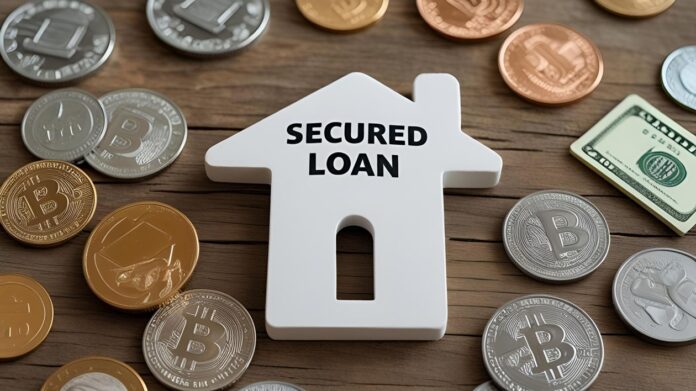You need to understand the kinds of loans when you are planning to borrow money for a home, vehicle, education or business. The most frequent types are known as secured loans and unsecured loans. The first big difference lies in the interest rate which shows the cost of borrowing. Interest rates for secured loans are usually less than for unsecured loans. Exactly why does it occur?
We will look at secured loans one step at a time to see why they are cheaper and why you might choose them over other types.
Question
The cost of a secured loan is typically lower than the cost of an unsecured loan because _______.
Options:
A) The lender has no risk
B) It is easier to get
C) The loan is larger
D) The lender can seize the collateral
Correct Answer: D) The lender can seize the collateral
Explanation
The lower price of secured loans over unsecured loans comes from the use of collateral. A secured loan requires you to promise to give something such as your car, house or savings as proof that you’ll pay the loan. If you do not make the payments, the lender has a legal right to take the collateral.
This reduces the lender’s risk, which is why:
- Interest rates are lower
- Loan amounts can be higher
- Approval chances may be better
When you take an unsecured loan, there is no asset supporting the loan. So if you don’t pay, the lender might not be able to do much besides try to collect or take you to court for repayment. The higher level of risk causes lenders to increase the interest rates they charge.
Here’s a simplified breakdown:
| Loan Type | Backed by Collateral | Risk to Lender | Typical Interest Rate |
| Secured Loan | Yes | Lower | Lower |
| Unsecured Loan | No | Higher | Higher |
Example:
A 6% interest rate may apply to a secured $10,000 loan compared to an unsecured version which could be more than 12%, making borrowing become twice as expensive in the long run.
What Is a Secured Loan?
Secured loans are given after an asset or collateral supports them. It safeguards the lender: if the borrower fails to repay, the lender may legally claim the asset and sell it to clear the loan balance.
Common Types of Secured Loans:
- Mortgage Loans: Secured by the home you’re buying
- Auto Loans: Secured by the vehicle you’re purchasing
- Secured Personal Loans: May use savings accounts or CDs as collateral
- Home Equity Loans: Secured by the equity in your home
These loans are often easier to get if you have poor credit, since the collateral reduces the lender’s exposure to risk.
Advantages of Secured Loans:
- Lower interest rates
- Higher borrowing limits
- Potentially easier approval
Risks:
If you default on the loan, your asset could be taken. Be sure you can handle the loan payments every month before signing up for a secured loan.
Secured vs Unsecured Loan
| Feature | Secured Loan | Unsecured Loan |
| Requires Collateral? | Yes | No |
| Risk to Lender | Low (can seize collateral) | High (no asset backing) |
| Interest Rate | Lower | Higher |
| Borrower Qualification | Easier for lower credit scores | Requires strong credit history |
| Loan Amount | Higher possible | Usually lower |
| Approval Time | May take longer (due to asset checks) | Usually faster |
When to Choose a Secured Loan:
- You have an asset you’re willing to pledge
- You want lower interest rates
- You need a large amount of money
When to Choose an Unsecured Loan:
- You don’t have collateral
- You need faster access to funds
- You’re borrowing a small amount
FAQs
Q1. Is a secured loan safer than an unsecured loan?
When the loan is provided by a lender, this clause is very important. If you don’t pay a secured loan, you could lose your asset. The interest rates on unsecured loans might be higher, but you will not lose any property if you cannot pay them (but your credit rating will go down).
Q2. Is a secured loan with bad credit possible?
Yes. Since the collateral gives security, people with poor credit scores have a better chance of getting a secured loan.
Q3. What happens if I default on a secured loan?
If your payments are late or don’t happen at all, the lender can take the collateral like your car or begin a foreclosure on your home (depending on the kind of loan).
Q4. Do secured loans help build credit?
Yes. As with an unsecured loan, a secured loan will improve your credit provided you are on top of your payments.
Q5. Are secured loans always cheaper?
Most of the time, yes, because the chance of risk is lower for the lender, they tend to give lower interest rates. Your loan rate will be different according to your credit, amount borrowed, length of the loan and any supporting collateral.
Summary
Collateral in a secured loan gives the lender permission to take it if the borrower is unable to pay which lowers the cost of lending for the borrower. The steady cash flow makes the loan less risky for the lender which results in lower interest rates on the loan.
Understanding the difference between secured and unsecured loans empowers you to make smart borrowing decisions that protect your finances long-term.






